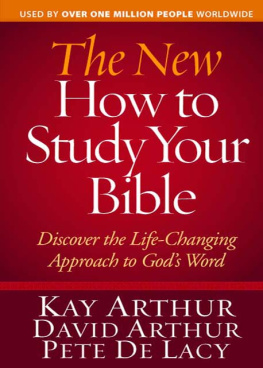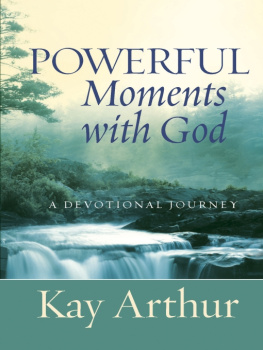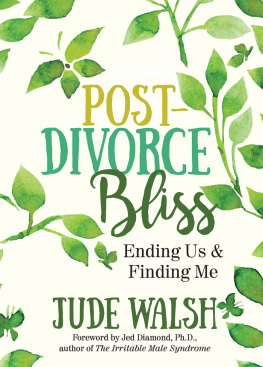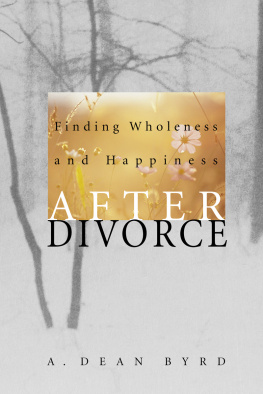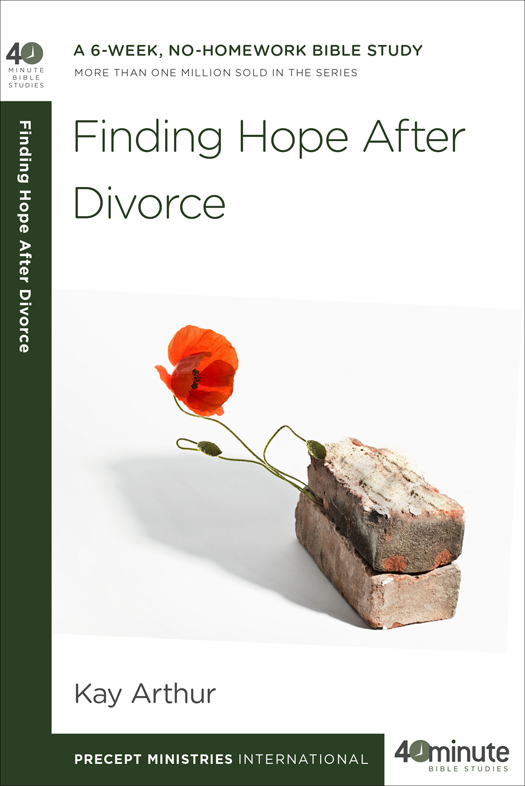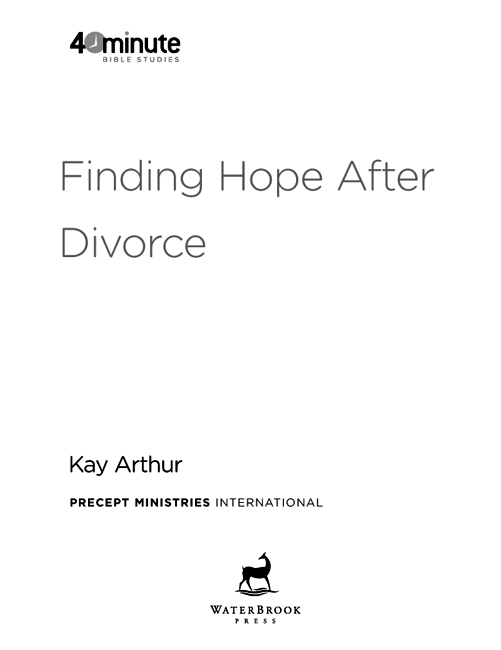F INDING H OPE A FTER D IVORCE
P UBLISHED BY W ATER B ROOK P RESS
12265 Oracle Boulevard, Suite 200
Colorado Springs, Colorado 80921
Scripture quotations or paraphrases are taken from the following versions: New American Standard Bible. Copyright The Lockman Foundation 1960, 1962, 1963, 1968, 1971, 1972, 1973, 1975, 1977, 1995. Used by permission. (www.Lockman.org). The Holy Bible, English Standard Version, copyright 2001 by Crossway Bibles, a division of Good News Publishers. Used by permission. All rights reserved.
Trade Paperback ISBN 978-1-60142-558-4
eBook ISBN 978-1-60142-559-1
Copyright 2014 by Precept Ministries International
Cover design by Kristopher K. Orr
All rights reserved. No part of this book may be reproduced or transmitted in any form or by any means, electronic or mechanical, including photocopying and recording, or by any information storage and retrieval system, without permission in writing from the publisher.
Published in the United States by WaterBrook Multnomah, an imprint of the Crown Publishing Group, a division of Random House LLC, New York, a Penguin Random House Company.
W ATER B ROOK and its deer colophon are registered trademarks of Random House LLC.
S PECIAL S ALES
Most WaterBrook Multnomah books are available at special quantity discounts when purchased in bulk by corporations, organizations, and special-interest groups. Custom imprinting or excerpting can also be done to fit special needs. For information, please e-mail or call 1-800-603-7051.
v3.1_r1
CONTENTS
Taking Notes

When you see the pencil icon above, you may want to fill out your answers on a separate piece of paper or use the Notes functionality on your eReader.
If you are using a touch-screen reader or app, simply hold your finger over the first word in the line and then select Note to create a note and begin typing your answer.
If you are using a non-touch-screen reader, move your cursor up to the line where you want to enter an answer and then begin typing to create a new note.
You can then reference your answers anytime you are reading the eBook as they will be stored as notes on your device.
HOW TO USE THIS STUDY
This small-group study is for people who are interested in learning for themselves more about what the Bible says on various subjects, but who have only limited time to meet together. Its ideal, for example, for a lunch group at work, an early morning mens group, a young mothers group meeting in a home, a Sunday-school class, or even family devotions. (Its also ideal for small groups that typically have longer meeting timessuch as evening groups or Saturday morning groupsbut want to devote only a portion of their time together to actual study, while reserving the rest for prayer, fellowship, or other activities.)
This book is designed so that all the groups participants will complete each lessons study activities at the same time. Discussing your insights drawn from what God says about the subject reveals exciting, life-impacting truths.
Although its a group study, youll need a facilitator to lead the study and keep the discussion moving. (This persons function is not that of a lecturer or teacher. However, when this book is used in a Sunday-school class or similar setting, the teacher should feel free to lead more directly and to bring in other insights in addition to those provided in each weeks lesson.)
If you are your groups facilitator, the leader, here are some helpful points for making your job easier:
Go through the lesson and mark the text before you lead the group. This will give you increased familiarity with the material and will enable you to facilitate the discussion with greater ease. It may be easier for you to lead the group through the instructions for marking the text, if you, as a leader, choose a specific color for each symbol you mark.
As you lead the group, start at the beginning of the text and simply read it aloud in the order it appears in the lesson, including the insight boxes, which appear throughout. Work through the lesson together, observing and discussing what you learn. As you read the Scripture verses, have the group say aloud the word they are marking in the text.
The discussion questions are there simply to help you cover the material. As the class moves into the discussion, many times you will find that they will cover the questions on their own. Remember, the discussion questions are there to guide the group through the topic, not to squelch discussion.
Remember how important it is for people to verbalize their answers and discoveries. This greatly strengthens their personal understanding of each weeks lesson. Try to ensure that everyone has plenty of opportunity to contribute to each weeks discussions.
Keep the discussion moving. This may mean spending more time on some parts of the study than on others. If necessary, you should feel free to spread out a lesson over more than one session. However, remember that you dont want to slow the pace too much. Its much better to leave everyone wanting more than to have people dropping out because of declining interest.
If the validity or accuracy of some of the answers seems questionable, you can gently and cheerfully remind the group to stay focused on the truth of the Scriptures. Your object is to learn what the Bible says, not to engage in human philosophy. Simply stick with the Scriptures and give God the opportunity to speak. His Word is truth (John 17:17)!
FINDING HOPE AFTER DIVORCE
I want a divorce. You may have heard it. You may have said it. Either way, the words speak of failureand failure is hard to bear, hard to excuse, hard to accept, and hard to get over.
Some people say those wordsI want a divorceare more devastating than learning of a mates death. Death brings marriage to an end; theres no recourse, no reversal. But in divorce, you both still live. And you have to live with that!
If the words came from your mate, then more than likely you feel faulted, rejected, scorned, cast away.
Questions flood your mind: What am I going to do? How will I survive? Who will take care of me? What about the children? Whose side will they take? What will people think of me? What does God think of me?
When you try to look ahead to the future, all you can see are more questions:
Am I doomed to be alone forever? Damaged goods?
Will God ever again use me in ministry, or will I always wear a scarlet D in Christian circles? What will people in the church think? How will they treat me?
And what about our friends? Whose friends will they be? Will aloneness define my life?
We could fill pages with question upon questionsome rational, some irrational. Questions that keep you awake, that wont go away, that keep you wondering how you will ever get out of bed and do life in the morning.
So how can you get through this? Live with it?
First and foremost, you need to know that if you are a child of God, believe it or not, you are beloved of God. He says it over and over again in His book, the Bible.
And if youre not His child yet, then the reason you have this book in your hands is because God wants to lavish His love on you. He wants to call you beloved, even though you may feel there is nothing lovable about you.


